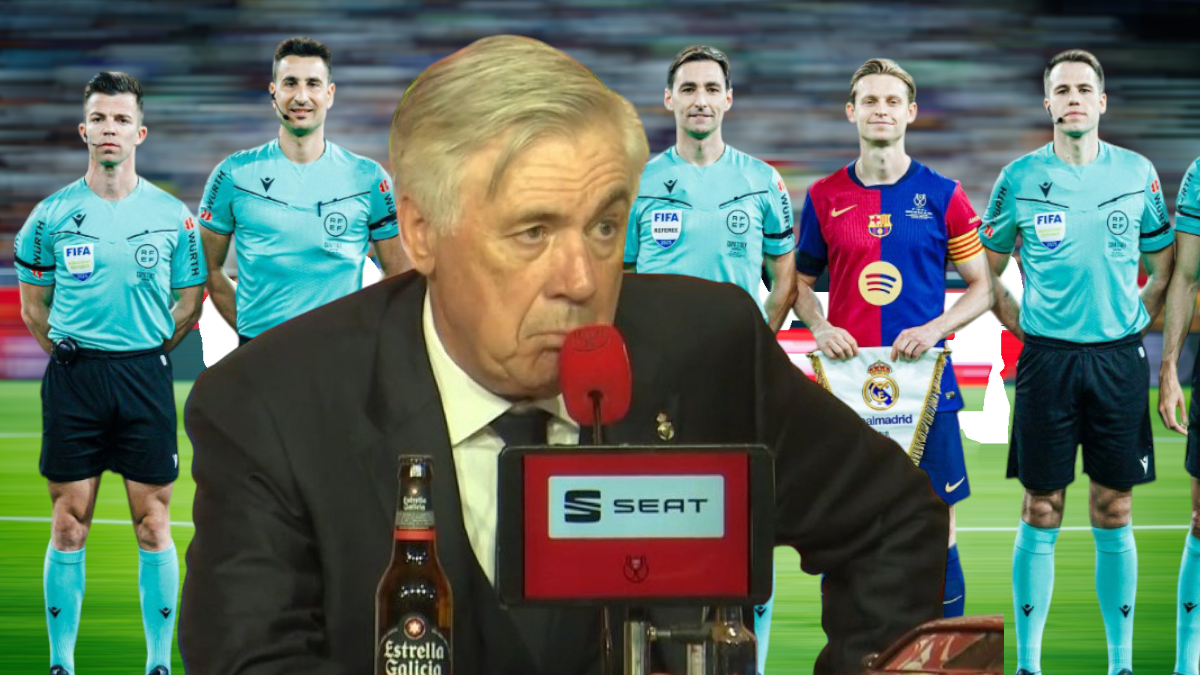Sport
Clasico perdu 3-2: Carlo Ancelotti makes a surprising admission about the refereeing

The Copa del Rey final between Barcelona and Real Madrid ended in heartbreak for Los Blancos, who fell 3-2 in a thrilling encounter. Yet it wasn’t just the result that sparked headlines — Carlo Ancelotti’s surprising reaction afterward caught everyone’s attention.
Despite the intense controversy surrounding the referee Ricardo De Burgos Bengoechea and his VAR assistant Gonzalo Fuertes, Ancelotti — who is usually quick to criticize when he feels his team has been wronged — took an unexpected stance.
Before the final even kicked off, both De Burgos and Fuertes were under heavy scrutiny, particularly after controversial statements made to the press. Given the fiery atmosphere of a Clasico final, many feared that their officiating might sway under pressure.
During the match, several major incidents put their performance in the spotlight. Aurélien Tchouaméni escaped a potential red card for a dangerous tackle, and there were at least three penalty shouts involving Antonio Rüdiger, Federico Valverde, and Raúl Asencio that were dismissed without review.
Despite these questionable calls, Madrid players, including Rüdiger, lost their cool late in the match, resulting in three red cards for dissent. Archivo VAR, an organization that rates refereeing performances, gave De Burgos a poor score of 2 out of 10, citing three major errors that were largely favorable to Real Madrid.
Given all this, many expected Ancelotti to comment strongly on the refereeing. Instead, when asked about the officiating, the Italian coach simply replied, “I don’t want to talk about the referee,” offering no further criticism.
It was a short statement but one loaded with meaning. Coming from a manager who rarely holds back when upset, Ancelotti’s silence was a clear signal: Real Madrid’s defeat was not the referees’ fault.
In truth, the officials had shown unusual leniency toward Madrid, perhaps responding to the pre-match pressure. Mistakes were made, but they arguably worked in Madrid’s favor more often than not.
Ancelotti’s refusal to blame the officials revealed a deeper acceptance — that his team lost because they weren’t good enough on the night, not because of external factors.
This approach also showed wisdom. In a tense and emotional moment, choosing not to escalate controversy demonstrated Ancelotti’s maturity and experience at the highest level of football.
At the same time, it sent a message to his players: responsibility for failure lies within the team. There was no room for excuses.
This attitude could also protect Ancelotti himself. Publicly criticizing the refereeing after Madrid had arguably benefited from it could have backfired badly, especially with the club’s leadership watching closely.
Instead, Ancelotti kept the focus firmly on what matters: regrouping and aiming to finish the season strong. Real Madrid still has crucial matches ahead in La Liga and the Champions League.
While losing the Copa del Rey final hurts, there’s still everything to play for. The players and coaching staff must now channel their disappointment into a renewed push for silverware.
In the end, Ancelotti’s surprising reaction may prove to be one of the most important leadership moves of his season. Rather than creating chaos, he chose unity and responsibility — values that Real Madrid will desperately need in the decisive weeks ahead.

 Sport11 months ago
Sport11 months ago“I’m not trying to criticize Ancelotti, but I’m not happy with him for benching that player”: Bellingham Expresses Frustration Over Ancelotti’s Tactical Decision

 Sport11 months ago
Sport11 months agoBREAKING: Manchester City vs Liverpool Clash Cancelled! Title Race Takes a Twist

 Sport11 months ago
Sport11 months agoArsenal Poised for January Swoop on €70 Million Star Dusan Vlahovic

 Sport11 months ago
Sport11 months agoWHAT ON GOD’S GREEN EARTH DID WE JUST SEE?!

 Sport11 months ago
Sport11 months agoReal Madrid: Carlo Ancelotti’s Surprising Revelations About an Unexpected Quality of Vinicius

 Sport11 months ago
Sport11 months agoBREAKING: Arsenal’s Champions League Quarterfinal Opponent Revealed After Monaco’s Dramatic Win – Tough Challenges Await Arteta’s Men

 Sport11 months ago
Sport11 months agoChelsea Players Facing Suspension as Yellow Cards Mount

 Sport11 months ago
Sport11 months agoKey Arsenal Player Set for Return as Gunners Face Struggling Everton
















